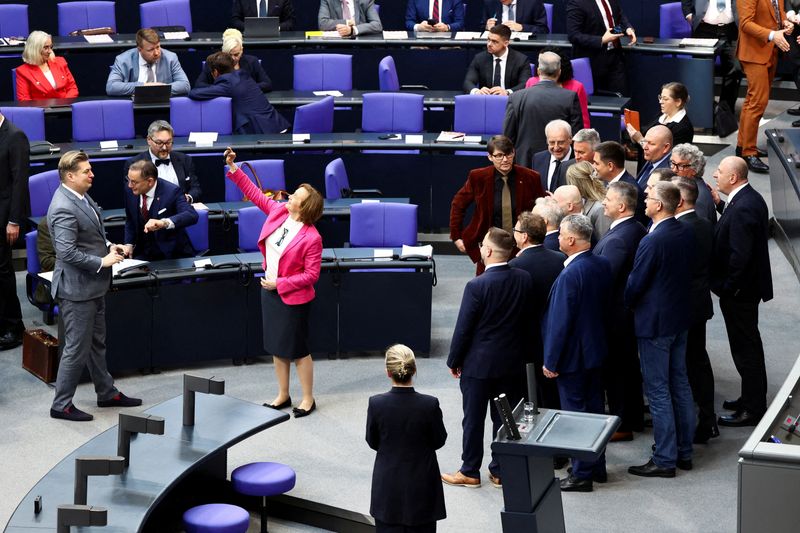Analysis-Isolated and fearing a ban, Germany’s far-right tones down the rhetoric

By Thomas Escritt and Sarah Marsh
BERLIN (Reuters) -Last weekend, Germany’s far-right lawmakers vowed to dress smartly, minimise parliamentary cat-calling, and signed up to a short manifesto notably omitting a call for repatriation of some immigrants that helped fuel their February election success.
The Alternative for Germany (AfD) is trying a tactical pivot away from the mix of attention-grabbing shock policies and provocative rowdiness that helped it become the second-largest parliamentary party, in a bid to go more mainstream and translate popularity into power, political commentators and a party insider said.
Being the largest opposition party has conferred privileges like being able to respond first to the government in parliament, but in Germany power comes from being in coalitions, and every other party rules out governing with the AfD.
Other parties have also prevented it from taking key positions on parliamentary committees as calls grow across the political spectrum for a ban on the AfD on account of its extremism.
So far, conservative Chancellor Friedrich Merz has opposed such a ban, which must be requested by either house of parliament or the government, and then examined by the Constitutional Court. The court has only banned a party twice in 1952 and 1956.
A senior party official who declined to be named said the new rules were all about “professionalising” the party – although some, especially founding figures in the party’s eastern heartlands who are not members of the national parliament, oppose changing a successful formula.
At stake is the 2029 election, which the party, four points behind Merz’s conservatives in some polls, could have a credible shot of winning. In the weeks following February’s election where it won 20.8 percent of the vote, it briefly surged to first place.
The AfD leadership hopes to follow hard-right parties like Italian Prime Minister Giorgia Meloni’s Brothers of Italy into the political mainstream, from where they could reshape the politics of Germany and Europe.
Far-right essayist Goetz Kubitschek, a mentor and close ally to Bjoern Hoecke, leader of the party’s most radical wing from the eastern state of Thuringia, said on his podcast: “I don’t understand why a party polling at 20% should change its agenda.”
The manifesto or position paper agreed to by all 152 legislators omitted the word “remigration” – used heavily by leader Alice Weidel in the election campaign and widely understood as a call for unassimilated non-ethnic-German citizens and migrants to leave the country.
The word was cited as evidence by a court that recently upheld a security service assessment that the AfD might be an extremist and therefore an unconstitutional party. To be banned in Germany, a political party must not only be deemed to take a position that undermines the functioning of Germany’s democratic order, it must also be acting on it with a chance of success.
The remigration phrase had become “toxic”, said one legislator present at the weekend gathering, who did not want to be named, adding that averting a ban was another goal.
An official spokesperson for the AfD did not immediately respond to a request for comment on any connections between the policy document and a desire to professionalize or head off a ban.
“The word remigration has been found to be unconstitutional and has no future,” wrote AfD legislator Maximilian Krah, once considered one of the party’s most radical figures. “Case closed. The court has spoken.”
Nevertheless, Weidel still lashed out at Germany’s migration policies in parliament this week.
A REAL CHANGE?
Many commentators are sceptical that the shift is any more than cosmetic.
“This ongoing discourse about a possible ban is getting under their skin,” said political scientist Oliver Lembcke, adding: “They are trying to be more palatable to other parties: it’s about getting a share of the power and seeking not to be marginalised.”
The AfD reorganised its youth organisation last year when its campaigns were criticised for being racist.
The regional politician Matthias Helferich, who was shown in leaked emails to have used language associated with the Nazis, was expelled from the party this week. He said he was a victim of a “show trial” by the party tribunal that expelled him. He denied being an extremist.
Merz’s conservatives remain committed to a policy of never governing with the AfD, but conservative parliamentary leader Jens Spahn suggested it was time to treat the AfD as an “ordinary” opposition party, which could see it get more access to non-partisan steering committees.
Merz, having concluded that former Chancellor Angela Merkel’s strategy of ignoring them was a failure, has started attacking Weidel in parliament directly, on Tuesday accusing her of trying to spread “bitterness” and “despair”.
It is unclear if all members will follow the party through its pivot. Hoecke pointedly posted an essay on remigration the day after the new strategy document was floated. “The AfD has given up the fight against population replacement,” wrote Paul Brandenburg, a prominent activist, on Telegram. “This is causing uproar among sympathisers.”
(Additional reporting by Andreas RinkeEditing by Alexandra Hudson)









